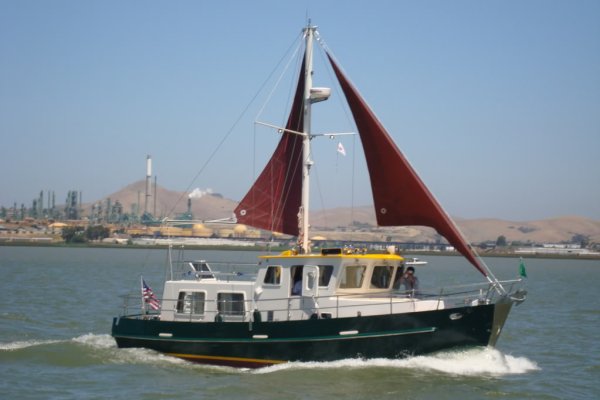rclarke246
Senior Member
- Joined
- Mar 17, 2014
- Messages
- 450
- Location
- USA
- Vessel Name
- Lady Di
- Vessel Make
- 2012 Beneteau Swift Trawler 44
OK, another vessel (40' Searay(?)) missed hitting me by less than 2' last week.
I was really shook up but relieved he missed me. Close calls are great learning experiences and I've given a lot of thought on avoiding similar situations.
Here's what happened: In an urban no-wake zone, Naples, Florida, I got trapped between a steel day mark and an oncoming vessel, with wind setting us both toward the day mark. 30-40 yard wide channel.
I believe that the captain of the oncoming vessel, seated starboard in his lower helm, was only focused on a very small and very slow rental, which was traveling in his direction, only 10-15' ahead of him. As I had just committed to pass the day mark to my starboard, with only 5-8' to spare, he decided to overtake the rental on his starboard side. Now, I had ZERO room to spare due to his maneuver and the wind. No time for a horn or anything!
I thought sure he had me but we somehow missed, probably because I turned full to port the instant his stern was going by. Not sure if he ever did anything to avoid me because I was too busy looking for an escape.
Anyway, no crash!!! A true miracle. It was sooo close, certainly less than 2'.
If if anything like this ever happens again I'm likely going to simply stop the boat before getting trapped. The guy behind me had better be alert, and I'll sound 3 blasts, but it's either that or taking my chances on the wrong side of the ATON.
I understand that "it takes 2 to tango".
OK, now the question:
What should I have done if there was a collision?
1) Assess condition of passengers.
2) regain situational awareness (any other dangerous vessels or obstacles?)
3) check for any hull breech
4) pan-pan VHF message (or may-day, if applicable)
5) get in touch with the other vessel, probably by VHF
I've had a lot of training (but less than 1,000 hours as captain) but I don't recall being taught about what to do. I guess most of it should be obvious but I'm interested in learning.
Thanks for your comments!
I was really shook up but relieved he missed me. Close calls are great learning experiences and I've given a lot of thought on avoiding similar situations.
Here's what happened: In an urban no-wake zone, Naples, Florida, I got trapped between a steel day mark and an oncoming vessel, with wind setting us both toward the day mark. 30-40 yard wide channel.
I believe that the captain of the oncoming vessel, seated starboard in his lower helm, was only focused on a very small and very slow rental, which was traveling in his direction, only 10-15' ahead of him. As I had just committed to pass the day mark to my starboard, with only 5-8' to spare, he decided to overtake the rental on his starboard side. Now, I had ZERO room to spare due to his maneuver and the wind. No time for a horn or anything!
I thought sure he had me but we somehow missed, probably because I turned full to port the instant his stern was going by. Not sure if he ever did anything to avoid me because I was too busy looking for an escape.
Anyway, no crash!!! A true miracle. It was sooo close, certainly less than 2'.
If if anything like this ever happens again I'm likely going to simply stop the boat before getting trapped. The guy behind me had better be alert, and I'll sound 3 blasts, but it's either that or taking my chances on the wrong side of the ATON.
I understand that "it takes 2 to tango".
OK, now the question:
What should I have done if there was a collision?
1) Assess condition of passengers.
2) regain situational awareness (any other dangerous vessels or obstacles?)
3) check for any hull breech
4) pan-pan VHF message (or may-day, if applicable)
5) get in touch with the other vessel, probably by VHF
I've had a lot of training (but less than 1,000 hours as captain) but I don't recall being taught about what to do. I guess most of it should be obvious but I'm interested in learning.
Thanks for your comments!

